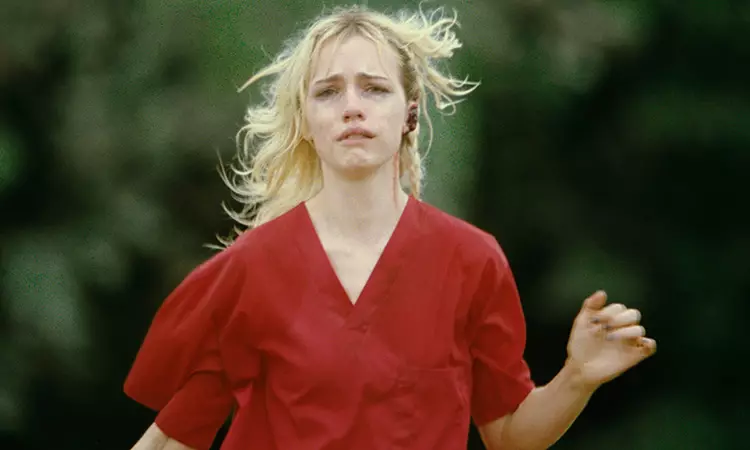“Are you a serial killer?” This shocking question, posed by a woman known only as The Lady (Willa Fitzgerald), sets the tone for ‘Strange Darling,’ a film that intertwines horror and emotional complexity in ways that challenge standard cinematic conventions. The male counterpart, The Demon (Kyle Gallner), does not merely embody malevolence; rather, he is a central character positioned within a complex narrative framework that shifts deeply and often. The film, directed by JT Mollner, defies chronological storytelling, presenting events that are out of sequence and forcing viewers to navigate a labyrinth of fear, desire, and moral ambiguity.
From the outset, ‘Strange Darling’ eschews traditional storytelling techniques, which allows it to introduce uncertainty and tension. With the chapter titles sequentially disrupted—starting at Chapter Three rather than Chapter One—the audience is thrust into the middle of the action. This disorienting approach serves to mirror The Lady’s plight as she races through the woods while being pursued by The Demon. With each fleeting moment, it becomes increasingly hard to discern what brought her to this critical juncture.
Notably, the cinematography capitalizes on the film’s rural setting, the seemingly innocuous woodland carrying an undercurrent of dread. The narrative unfolds with a sense of urgency, capturing the adrenaline of a classic chase while simultaneously revoking the expectation of a straightforward thriller. Instead, viewers are met with a kaleidoscope of genres—elements of romance, horror, and psychological thriller entwined within the storyline.
At first glance, The Lady appears to fulfill the trope of the “final girl,” a common character type found in slasher films characterized by resilience amidst chaos. Yet, as the film progresses, it becomes clear that she is not merely a victim, but a complex character shaped by her circumstances. Mollner’s character-driven narrative suggests a nuanced understanding of survival, challenging viewers to reconsider their perceptions of victimization and resilience.
Similarly, The Demon embodies confusion and contradiction. Initially perceived as a straightforward threat, his character is gradually unfurled in a way that reveals vulnerability behind his violent facade. This duality compels the audience to grapple with the moral implications of his actions, turning the traditional notions of predator and prey on their head. In this world, violence and desire are inextricably linked, complicating how viewers may feel about both characters.
The film’s very title, ‘Strange Darling,’ hints at the fusion of tenderness and terror, emphasizing the irritation and intimacy of violent relationships. Mollner’s writing encourages an analysis not just of the events transpiring on screen but also of the meanings behind them.
As the story unfolds, it subverts stereotypical gender roles, eroticizing the murder while also complicating the relationship dynamics between The Lady and The Demon. The dialogue and interpersonal exchanges prompt a reevaluation of power—who holds it, how it is exerted, and what it means when consent becomes ambiguous. In this topsy-turvy realm, the characters traverse a fine line between predator and victim, creating an unsettling atmosphere that invites conversation around consent and the ramifications of societal expectations.
‘Strange Darling’ provokes a great deal of thought and emotion, unraveling the layers of fear, desire, and morality within an unpredictable narrative landscape. The film refuses to neatly categorize its characters or present a clear-cut depiction of good and evil. Instead, it asks viewers to engage deeply with its themes, presenting an intriguing critique of the dynamics of power and survival. Through its complex characters and nonlinear storytelling, the film invites audiences to question not only the nature of its characters but also the very fabric of the genres it seeks to deconstruct. In doing so, ‘Strange Darling’ stands as a provocative commentary on the intricacies of human relationships in perilous circumstances, leaving a lasting impression of both dread and intrigue.

